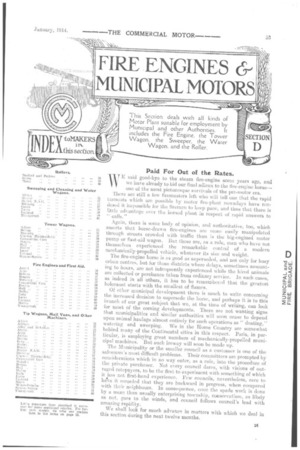FIRE ENGINES os
Page 55

If you've noticed an error in this article please click here to report it so we can fix it.
MUNICIPAL MOTORS
This Section deals with all kinds of Motor Plant suitable for employment by Municipal and other Authorities, it includes the Fire Engine, the Tower Wagon. the Sweeper. the Water Wagon, and the Roller.
Paid For Out of the Rates.
AlA, , TE said good-bye to the steam fire-engine some years ago, and AlA, , TE said good-bye to the steam fire-engine some years ago, and ' ' we have already to bid our final adieux to the fire-engine horse— one of the most picturesque survivals of the pm-motor era. There are still a few firemasters left who will tell one that the rapid turnouts which are possible by motor fite-plant nowadays have rendered it impossible for the firemen to keep pace, and thus that there is little advantage over the horsed plant in respect of rapid answers to calls."
Again, there is some body of opinion, and authoritative, too, which asserts that horse-drawn fire-engines are more easily manipulated through streets crowded with traffic than is the big-eugined motor pump or first-aid wagon. But these are, as a rule, men who have not themselves experienced the remarkable control of a modern mechanically-propelled vehicle, whatever its size and weight.
The fire-engine horse is as good as superseded, and not only for busy urban centres, but for those districts where delays, sometimes amounting to hours, arc not infrequently experienced while the hired animals are collected or perchance taken from ordinary service_ in such cases, as indeed in all others, it has to be remembered that the greatest holocaust starts with the smallest of flames.
Of other municipal development there is much to write concerning the increased decision to supersede the horSe, and perhaps it is to this branch of our great subject that we, at the time of writing, can look for most of the coming .developments. There are not wanting signs that municipalities and similar authorities will soon cease to depend upon animal .'haulage almost entirely for such operations as " dusting," watering, and sweeping. We in the Home Country are somewhat behind many of the. Continental cities in this respect.. Paris, in particular, is employing great 'numbers of mechanically-propelled mut& cipal machines. But such leeway will soon be made up.
The Municipality or the smaller council as a customer is one of the salesman's most difficult problems. Their committees are prompted by considerations which in no way enter, as a rule, into the procedure of the private purchaser. Not every council dares, with visions of outraged ratepayers, to be the first to experiment with something of which it has not first-hand experience. Few councils, nevertheless, care to have it rec.orded that they are backward in progress, when compared with their neighbours. In consequence, once the spade work is done by a more than usually enterprising township, conservatism, as likely as not, goes to the winds, and council follows council's lead with amazing rapidity.
We shall look for much advance in matters with which we deal in this section during the next twelve months.






















































































